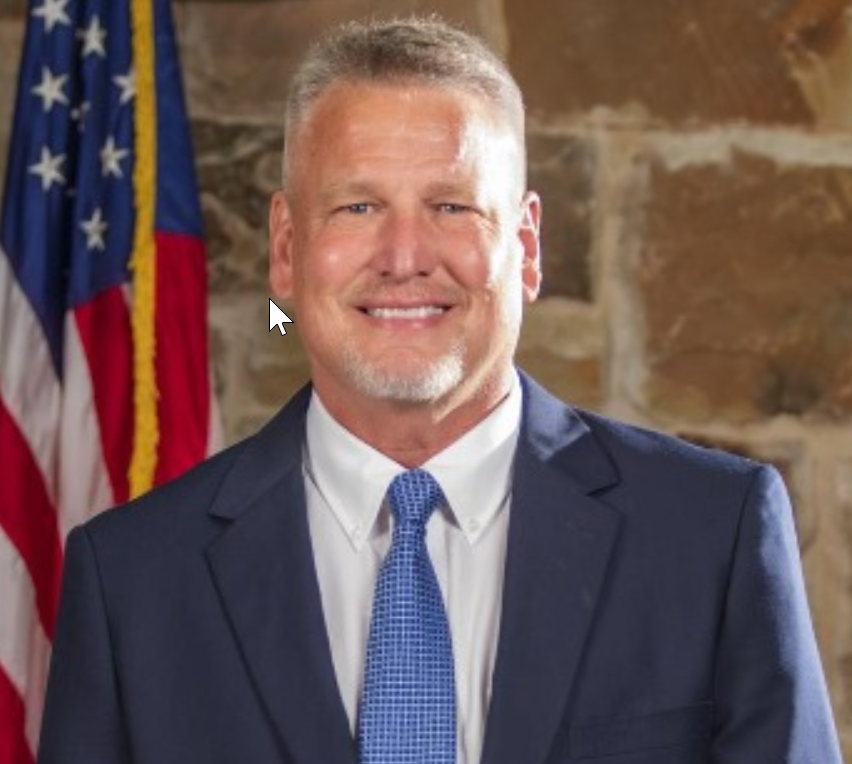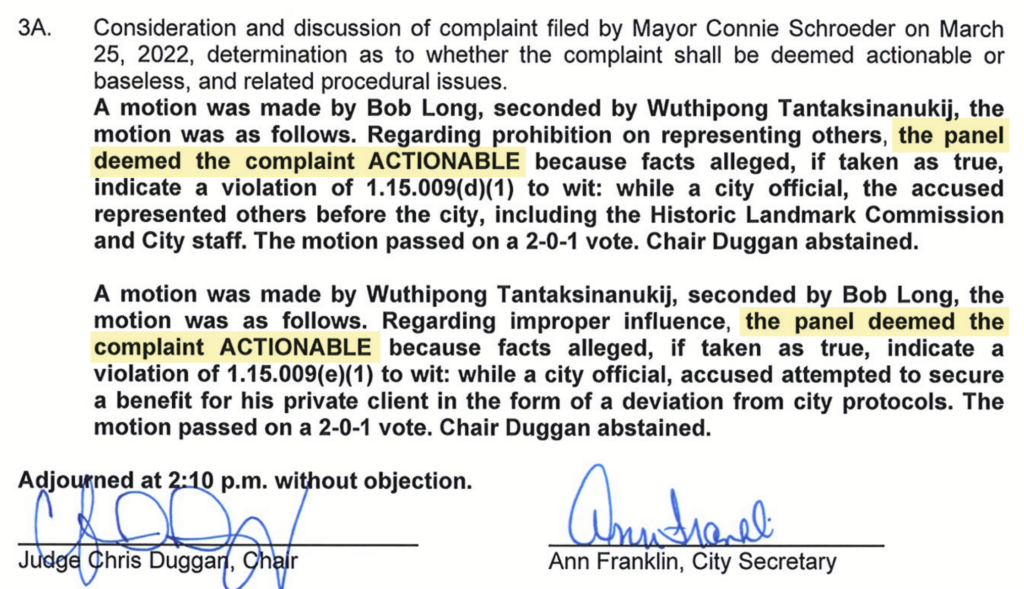It’s totally immoral for the government at any level to impugn your character without charging you. If you have the evidence, charge me. Or shut up. ~ Tucker Carlson March 10, 2025
Censure #1: Jimmy Crouch, City of Bastrop Council Member and Builder
 You’re likely unaware that in March 2022, an Ethics Complaint was filed against a then-sitting Council member, Jimmy Crouch. Hardly anyone I’ve asked knows or remembers that this happened.
You’re likely unaware that in March 2022, an Ethics Complaint was filed against a then-sitting Council member, Jimmy Crouch. Hardly anyone I’ve asked knows or remembers that this happened.
A complaint was filed accusing Crouch of representing “others before the city” and attempting “to secure a benefit for his private client”. Crouch admitted guilt and a resolution to that effect was passed by the City Council. Voting for that resolution were current members John Kirkland, Kevin Plunkett and Cheryl Lee.
The Crouch Chronology
In its meeting of April 11, 2022, the Board of Ethics found the complaints against Crouch to be substantive and “ACTIONABLE”. They determined that the facts, if true, were a violation of 1.15.009(d)(1) (representing others before the city while a city official) and 1.15.009(e)(1) (attempting to secure a benefit for [a] private client in the form of a deviation from city protocols).

On May 16, 2022, the Board of Ethics chose to enter into Dispute Resolution under Section G, a new procedure apparently added that very day after an Executive Session discussion. It is a procedure that is currently non-existent in the City of Bastrop ordinances regarding the Board of Ethics.
The May 16, 2022 agenda shows that first, “Discussion and action to amend Section E. 7 of the City of Bastrop Board of Ethics Rules of Procedure” took place, after which a motion was made and adopted 4-0 to so amend the rules. Minutes do not specify what that change was but the very next item was a “motion to avail to Subsection G. Dispute Resolution” for the Crouch ethics complaint. It was approved. Then the meeting was adjourned.
On June 28, 2022, City Council members Kirkland, Lee, Plunkett, and possibly Crouch (but the minutes aren’t clear) participated in an Executive Session to discuss this ethics complaint. After that Executive Session, those Council members, including current Council members Kirkland, Plunkett and Lee, voted their support of a “mediated settlement” (R-2022-58) of the Ethics complaints against Councilman Crouch.
On July 22, 2022, after the City Council vote, that “negotiated resolution” was also approved by the Board of Ethics by a 5-0 vote.
R-2022-58 included an admission of guilt by Councilman Jimmy Crouch.
John Kirkland never demanded Jimmy Crouch resign his Council seat. John Kirkland made no effort to recall Jimmy Crouch.
In 2024, two years later almost to the day, Kirkland and Plunkett actually voted to appoint Jimmy Crouch to the Charter Commission. That happened after he voted in favor of the Gateway Project behind Buc-ces. And just a few weeks ago, Jimmy Crouch was nominated by Kirkland to sit on the Planning & Zoning Commission. The nomination was approved by Council with both Kirkland and Plunkett voting in favor.
What does Jimmy Crouch do for a living? Well, no surprise there…. Jimmy Crouch is a developer. His bio from the City website states:
“His knowledge and experience in the commercial construction field will help tremendously in the next phase of Bastrop’s growth. He has built for major companies such as HEB, Coca-Cola, USACE, Living Spaces Furniture and The University of Utah among others. He has had the privilege to be part of the team that built the Lost Pines Art Center and the new 921 Main Street building here in Bastrop. Working on these projects has given him an opportunity to see what building processes work within the City of Bastrop Building Departments. He is also a current member of the Greater Austin Home Builders Association.“
So much for consequences for admitted unethical behavior. Apparently, ethics be damned if you’re a developer.
Censure #2: Lyle Nelson, City of Bastrop Council Member and Mayor
 Compare that story to the ethics complaint John Kirkland filed against Mayor Lyle Nelson.
Compare that story to the ethics complaint John Kirkland filed against Mayor Lyle Nelson.
Kirkland, Plunkett and Crouch are the very people who voted to move forward on an Ethics Complaint against Nelson well before legal investigations were complete. John Kirkland was the driving force behind the Nelson recall petition. Kirkland, Plunkett, Crouch and their families obtained more than 75% of the signatures on that petition.
In early 2024, Kirkland wrote the Nelson complaint and testified at the Board of Ethics hearing. Were you aware that in December 2023, the City Council hired investigator had found no evidence of misuse of funds, no evidence of sharing confidential information, no conflicts of interest? City Manager Sylvia Carrillo was aware of those findings and thus the Council should have been.
Compare the investigator’s exoneration of Nelson to the Crouch ethics complaint where Crouch admitted guilt.
Kirkland’s rationale in the Nelson complaint is interesting. Every Code of Ethics concern cited by Kirkland is applicable to the Crouch complaint.
“The Bastrop Code of Ethics lays out expectations of city officials. The first 5 are reproduced here to make a point.
(a) City officials are expected to conduct themselves in a manner that fosters public trust.
(b) City officials are charged with performing their public duties in a way that projects a high level of personal integrity and upholds the integrity of the organization.
(c) City officials must avoid behavior that calls their motives into question and erodes public confidence.
(d) City officials shall place the municipality’s interests and the concerns of those the city serves above private, personal interests.
(e) Those who serve the city are expected to value honesty, trustworthiness, diligence, objectivity, fairness, due process, efficiency, and prudence as values the city professes.”
crouch vs nelson results
What happened to Jimmy Crouch? Nothing happened to him. He did lose re-election but what a difference a year makes. He is now, once again, a favored son. He now has been appointed to two boards, one of which has a major impact on development in the City.
What happened to Lyle Nelson who was exonerated in the December 2023 report and never charged with anything at any level of law enforcement? John Kirkland went after Lyle Nelson with a vengeance. John Kirkland whipped up the public into a frenzy by going door-to-door himself to collect far more than 50% of the signatures on the recall petition. John Kirkland led the charge to stop Lyle Nelson from representing the City in any manner whatsoever.
John Kirkland voted “yes” finding Jimmy Crouch actually guilty. Then did nothing: no recall, no admonition, no consequences.
character counts in our representatives
I’ve always believed that consistency is critical in elected officials. After all, don’t we believe that the law applies to all equally? Isn’t our Country founded on equal protection under the law? Didn’t we fight a war to end a monarchy that treated people differently dependent on their status?
Apparently, John Kirkland, Kevin Plunkett and their buddies could care less about consistency and equal protection under the law. The proof is in the Tale of Two Censures.

 Ask yourself how a candidate will manage taxpayer money if they can’t properly manage campaign funding. Ask yourself who will get their ear and vote if they’ve taken money from developers and development-related PACs (Political Action Committees).
Ask yourself how a candidate will manage taxpayer money if they can’t properly manage campaign funding. Ask yourself who will get their ear and vote if they’ve taken money from developers and development-related PACs (Political Action Committees).  In late 2023, Festival de la Cultura, Inc. requested a $25,000 taxpayer funded donation from the City of Bastrop. On October 24, 2023, just five days after the corporation was registered with the State of Texas and one day after the corporation applied (but was not yet approved) for IRS non-profit status, John Kirkland seconded a motion to give Cooper’s corporation $25,000 in taxpayer funded money. It was unanimously approved and check number 152230 was cut to Cooper’s corporation on October 27. (For more details on this transaction, read my blog post
In late 2023, Festival de la Cultura, Inc. requested a $25,000 taxpayer funded donation from the City of Bastrop. On October 24, 2023, just five days after the corporation was registered with the State of Texas and one day after the corporation applied (but was not yet approved) for IRS non-profit status, John Kirkland seconded a motion to give Cooper’s corporation $25,000 in taxpayer funded money. It was unanimously approved and check number 152230 was cut to Cooper’s corporation on October 27. (For more details on this transaction, read my blog post 
 Cooper‘s LLC gets $25,000 of taxpayer money with Kirkland‘s second-on-the-motion and vote. A few months later, Cooper sends an email calling for Nelson’s resignation (yet he never sent such an email calling for
Cooper‘s LLC gets $25,000 of taxpayer money with Kirkland‘s second-on-the-motion and vote. A few months later, Cooper sends an email calling for Nelson’s resignation (yet he never sent such an email calling for  You’re likely unaware that in March 2022, an Ethics Complaint was filed against a then-sitting Council member, Jimmy Crouch. Hardly anyone I’ve asked knows or remembers that this happened.
You’re likely unaware that in March 2022, an Ethics Complaint was filed against a then-sitting Council member, Jimmy Crouch. Hardly anyone I’ve asked knows or remembers that this happened.
 Compare that story to the ethics complaint John Kirkland filed against Mayor Lyle Nelson.
Compare that story to the ethics complaint John Kirkland filed against Mayor Lyle Nelson.